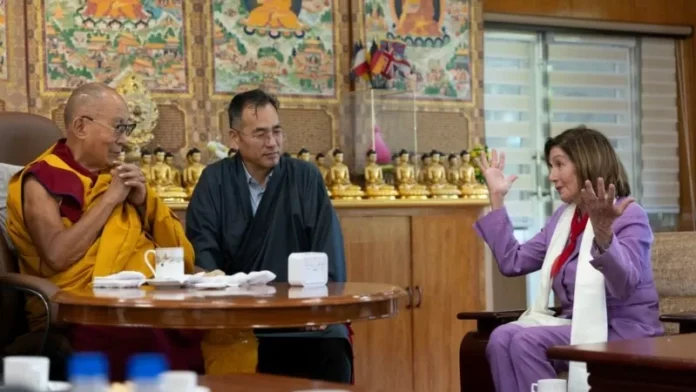New Delhi – A delegation of U.S. lawmakers met with the Dalai Lama in the northern town of Dharamshala on Wednesday, drawing cheers from the Tibetan community in exile and sparking a strong reaction from China, which regards the Tibetan spiritual leader as a separatist and a splittist.
The visit comes in the wake of the passing of a bill by the U.S. Congress last week, which aims to promote dialogue between Beijing and Tibetan leaders in exile who have been advocating for more autonomy for Tibet. Previous talks between the Dalai Lama’s representatives and China have been at a standstill since 2010.
Nancy Pelosi, former House Speaker and one of the leading figures in the seven-member delegation, addressed hundreds of Tibetans at a public ceremony after meeting with the Dalai Lama at his residence. She declared that the passing of the “Promoting a Resolution to the Tibet-China Dispute Act,” also known as the Resolve Tibet Act, was a clear message to the Chinese government that the U.S. stands firmly with the Tibetan people in their fight for freedom.
The visit of the U.S. lawmakers to Dharamshala, the seat of the Tibetan government in exile, has brought renewed hope to the Tibetan community. Tenzin Lekshay, spokesperson for the Central Tibetan Administration, told VOA that the visit is a moment of jubilation for all Tibetans. He added that it holds great significance as it comes soon after the passing of the bill, which they hope will soon be signed into law by U.S. President Joe Biden.
Congressman Michael McCaul, who led the delegation, stated that the bill reaffirms America’s support for the Tibetan people’s right to self-determination. However, the Chinese Communist Party sent a warning letter to the delegation, urging them not to visit Dharamshala.
In response, the Chinese foreign ministry spokesman Lin Jian stated on Tuesday, as the lawmakers arrived in India, that China will take “resolute measures” to defend its sovereignty, security, and development interests. The Chinese embassy in New Delhi also released a statement reiterating China’s concerns and urging the U.S. to recognize the “anti-China separatist nature” of the Dalai group and to stop sending “wrong signals” to the world.
During his address to the Tibetan community, Congressman McCaul emphasized the importance of not letting China influence the choice of the Dalai Lama’s successor. He stated, “Beijing has even attempted to insert itself into choosing the successor of the Dalai Lama. We will not let that happen.” This issue is of great importance, as China claims to have the right to approve the spiritual leader’s successor, while the Tibetan tradition believes in the reincarnation of the Dalai Lama. The Tibetan community fears that China will try to designate a successor in order to tighten its control over Tibet.
Tibetan spokesperson Tenzin Lekshay stressed the need for China to come forward and resume dialogue with exiled Tibetan leaders. He stated, “It is time for China to reflect on what is going wrong, particularly with the Tibet issue, which has been a longstanding conflict. China needs to take a more positive approach.”
It should be noted that China does not recognize the exiled Tibetan administration and the formal dialogue process between the Dalai Lama’s representatives and the Chinese government ended in 2010 without any concrete outcome. Lekshay also clarified that the Tibetan community is not seeking independence from China, but rather autonomy within the country. The Tibetan cause is not a separatist movement, but a call for the preservation of their culture, language, and identity, which is under threat due to China’s assimilation of the region.
The Dalai Lama, who fled to India in 1959, has been a prominent figure in bringing global attention to the Tibetan cause. However, in recent years, some Tibetan activists have expressed concerns that the issue is not receiving enough attention from Western nations.
The town of Dharamshala, nestled in the Himalayas, has been the Dalai Lama’s home for over six decades since his escape from Tibet following a failed uprising against Chinese rule. The visit of the U.S. lawmakers to this historic town has once again highlighted the plight of the Tibetan people and their struggle for freedom.
In conclusion, the U.S. lawmakers’ visit to Dharamshala and their support for the Tibetan cause is a significant step towards promoting dialogue and finding a

